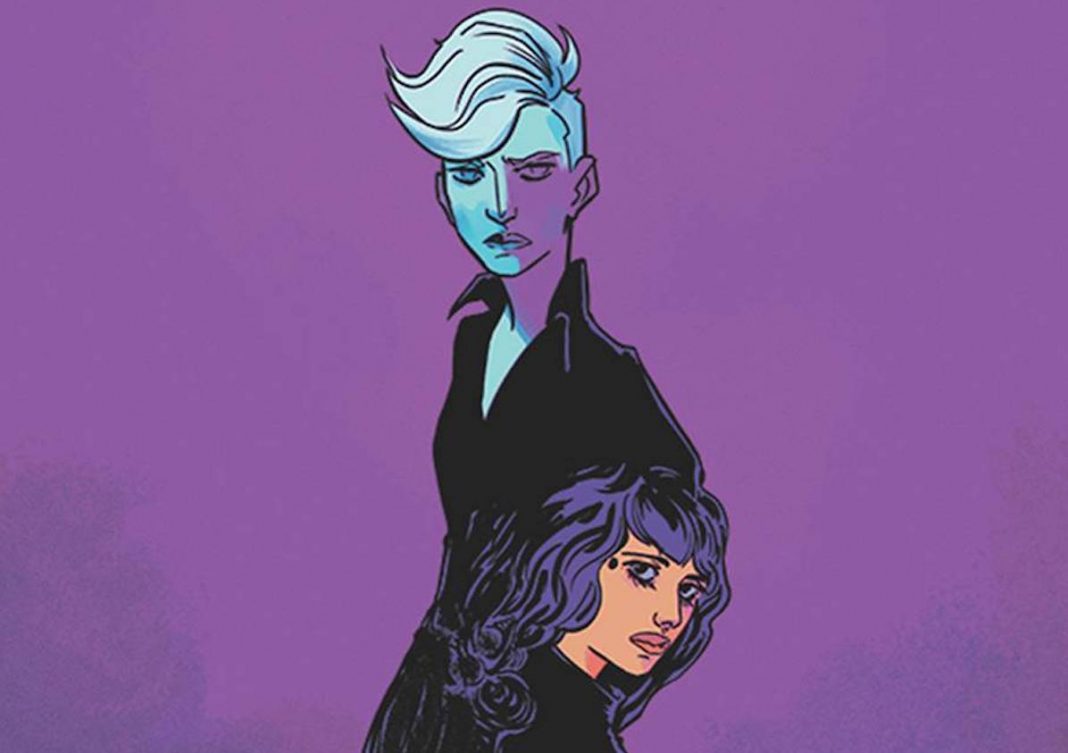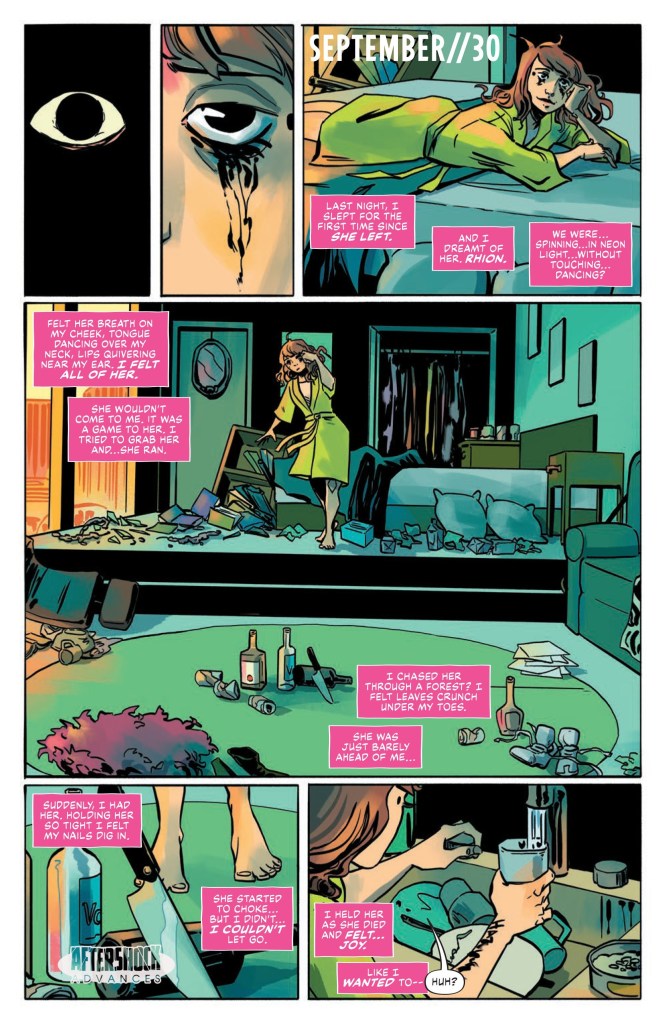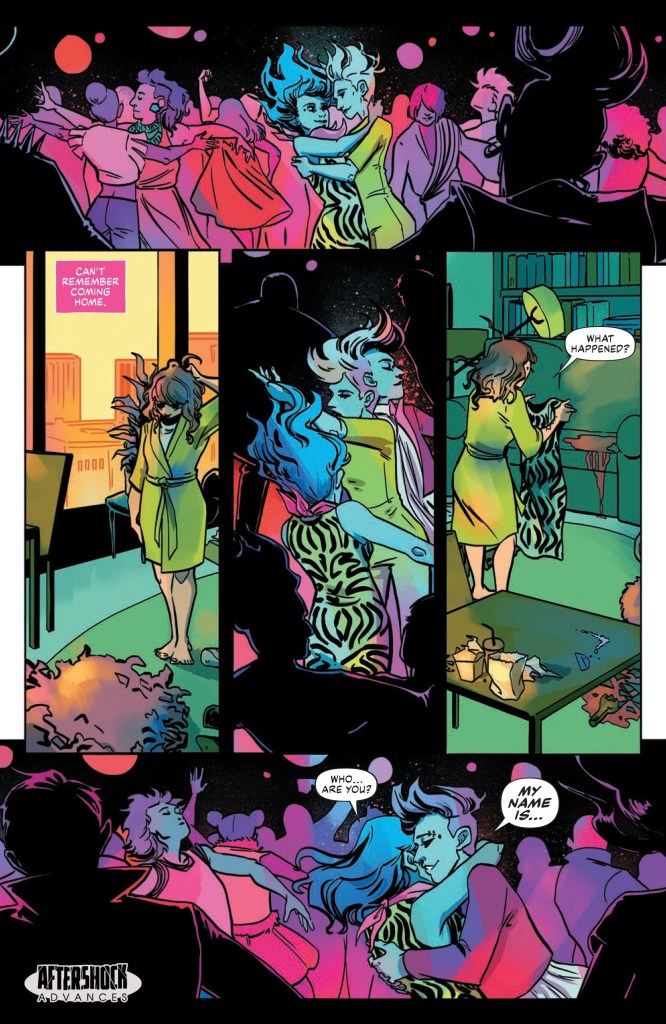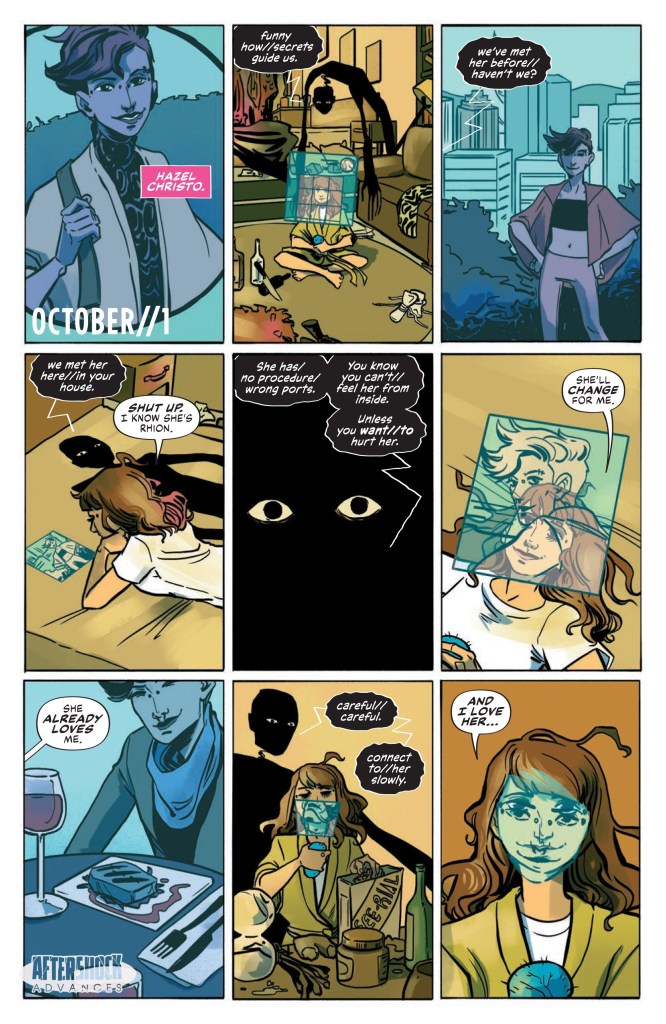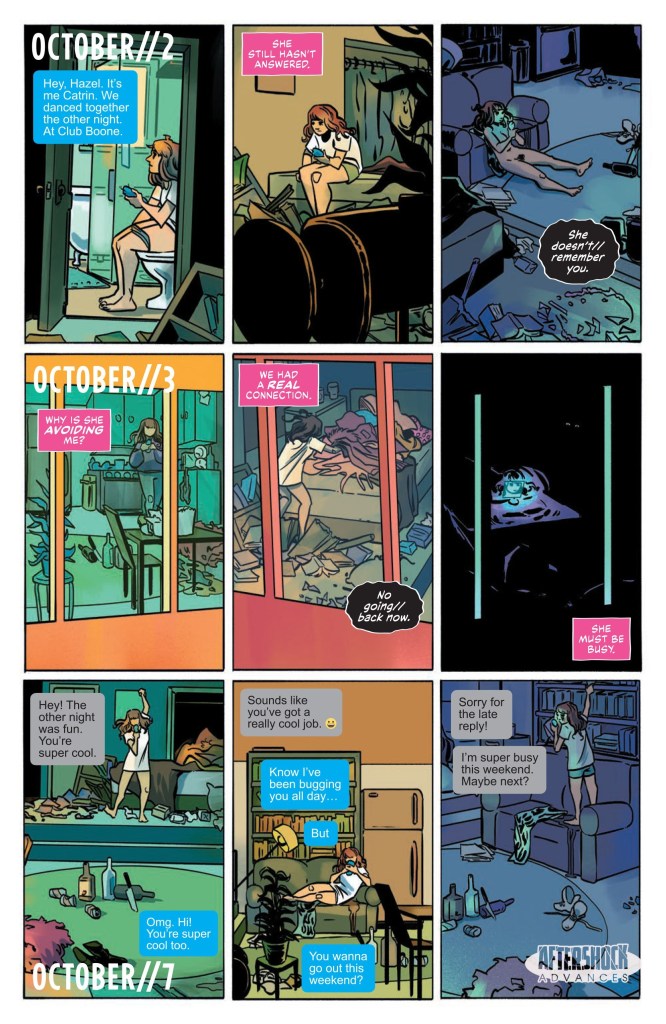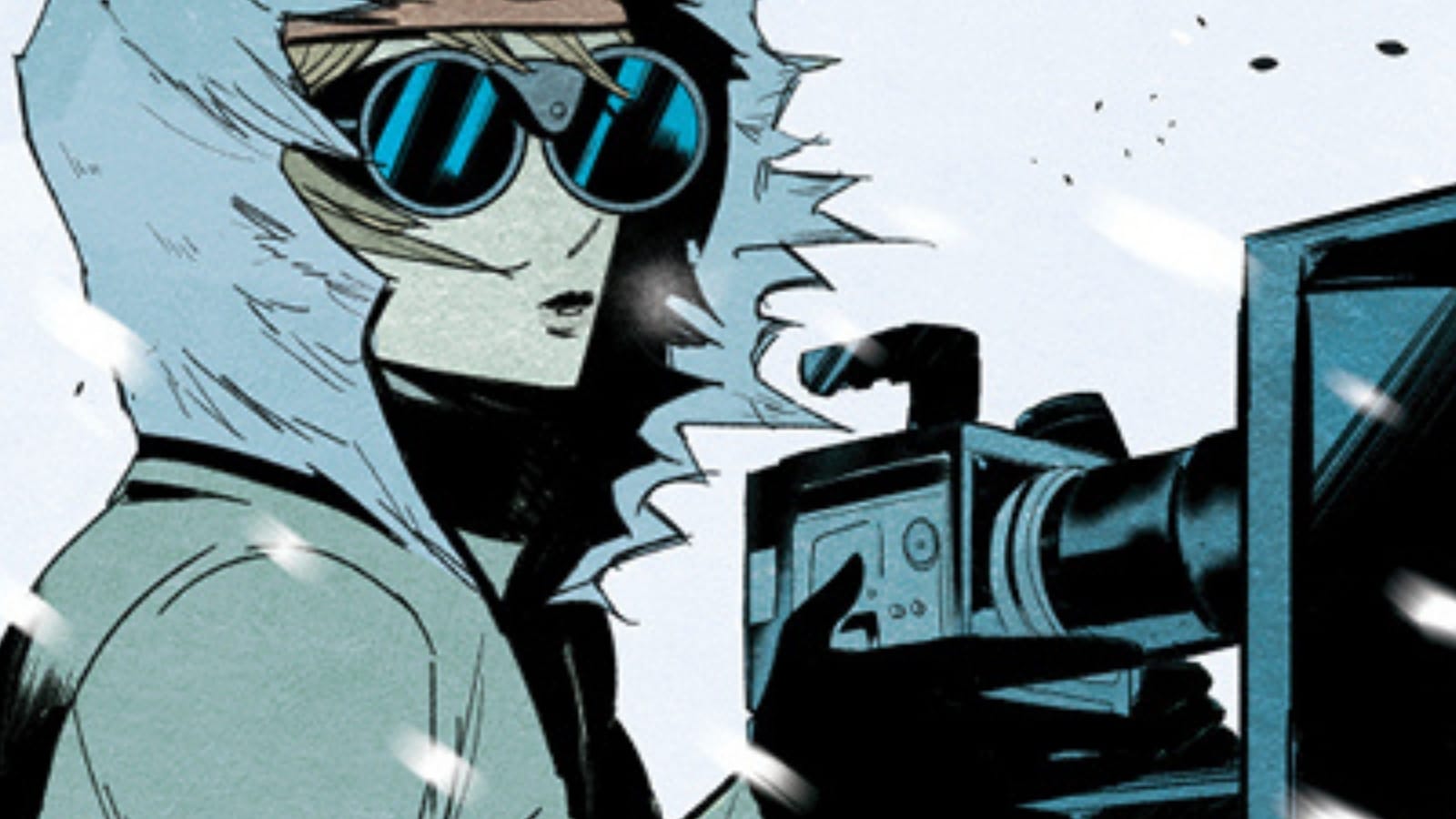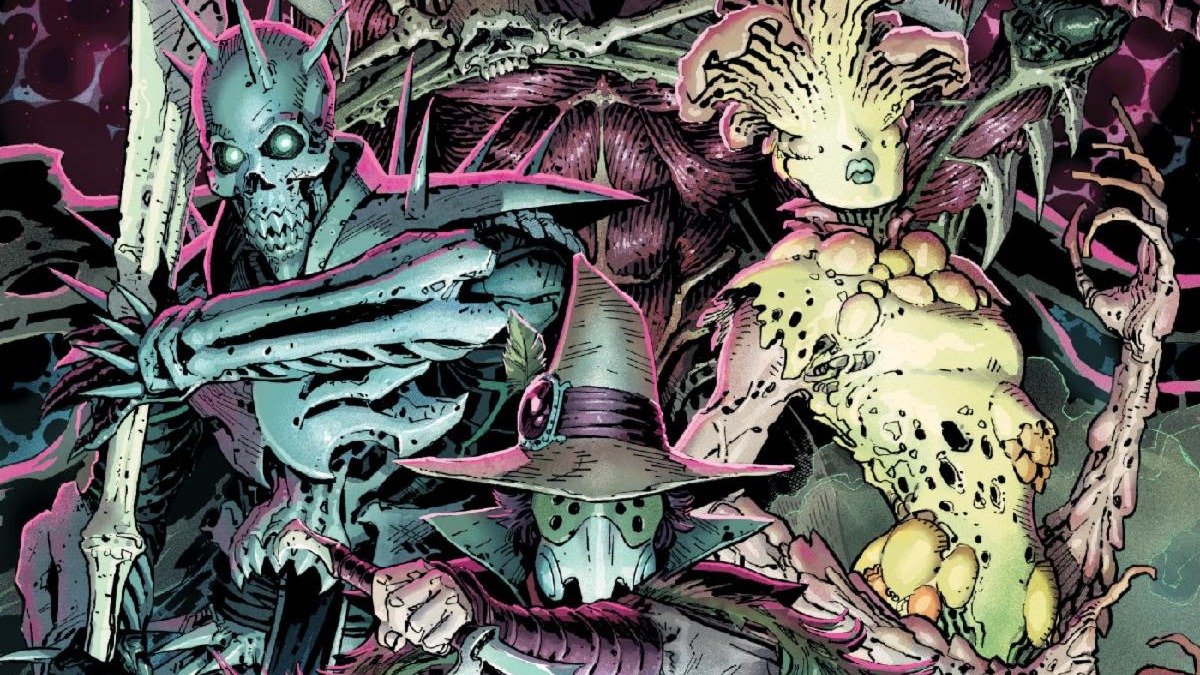If you’re not reading Lonely Receiver, you really ought to be. The book — currently between its second and third issue — is unique within the direct comics market, combining as it does ingredients like tech reliance, body horror, and the honest raw pain of being on the lonelier end of a breakup.
On the surface, the concept might seem a bit like the 2013 film her, and there is certainly a romantic relationship with an A.I. (or so it seems) at this book’s center. But this is a story that goes far deeper and darker than that film could, taking the central relationship to scarier and more poignant places. Anyway, this is all a long way of noting the book is good, and today The Beat has a new interview about it with two of the involved creators: writer Zac Thompson and artist Jen Hickman (the third creator on this book is letterer Simon Bowland).
Check out our chat below, complete with new preview art from Lonely Receiver #3, which is slated for release Nov. 4.
Lonely Receiver Interview
ZACK QUAINTANCE: So, first things first…I love this comic, and I think it’s very much a singular book in terms of current releases. I’m curious, how did you two come together for this project? Was it an editorial pairing or was this a concept you developed together before pitching?
ZAC THOMPSON: I had come up with the idea for Lonely Receiver as being this colorful and neon-soaked comic that essentially disarms you with emotion that always acts in opposition to the art. I imagined that friction really creating something gut wrenching. I knew there needed to be a very special perspective on the art side, someone who was comfortable with some of the transgressive elements that I wanted to be in the narrative. I spent a long, long, long time searching for the right person. But it wasn’t until reading TEST from Vault that having Jen come on board sorta clicked into place for me. Their art and their voice were both the perfect fit for a book like this.
And strangely enough I had no idea about their tastes for the more transgressive elements of the narrative at the time. So when I pitched the book to them, it was a pretty resounding yes. And once they were on board they really helped in shaping the narrative into the sharpest version of itself. A lot of what you’re reading now grew organically from lots of collaborative talks between the two of us as the story pressed forward. I think the first issue took a while to get it to a place where we were both happy with it. But once it clicked, the rest of the book went so smoothly. Developing it together was a blast. Jen really encouraged me to let fucking loose and go wild where it counted.
JEN HICKMAN: For my part, Zac reached out just over a year ago about it and I immediately did all the standard stuff one does before working with a new person — skimmed his twitter, then checked out whatever works of his I could from the library. Mine only had The Dregs and Her Infernal Descent, both of which were co-written with Lonnie Nadler. I adored The Dregs and found Her Infernal Descent dull (sorry!) but both told me that whatever Lonely Receiver ended up being, it would be unlike any other comic out there, so I said yes to the weirdness.
QUAINTANCE: Can either of both of you talk about the intersection of technology and intimacy in this story? This book has left me with so many questions about our emotional connection to our devices, and I was wondering how consciously you thought about or discussed that while working on this title.
ZAC: I thought about this a lot. There is a weird level of intimacy we bring to our relationships with the devices in our pockets. For many people their phone is an object that they probably don’t see intimately or with any emotion at all. But if you think about it, most of us are intimate with our phones every day (be it watching porn, sexting, posting nudes, whatever). Our phones sorta act as this strange extension of ourselves and our relationship to technology tends to say a whole lot about us. Especially when it comes to that intimacy. I wanted to get into the details about why interacting with a phone is an emotional relationship like any other. Exploring what happens when you don’t establish clear boundaries.
I can’t help but think about how much the technology we use ends up using us. What sort of behavior changes do we make because our thinking is being shaped by addictive algorithms or the nuances implied by Twitter’s capitalistic goals. You begin to redefine yourself and your emotions in relationship to your phone. You start to see someone not “favoriting” your tweets as an act of passive aggression because of some strange narrative your feed helped create in your head. If left unexamined, our relationship with technology feeds our worst impulses and rots our ability to have a clear emotional relationship with anyone.
I think about this stuff way too much… and wanted each issue to sort of be a different way of looking through that complex prism.
QUAINTANCE: One of the things I like about the book is that it defies the neat boxes that so many modern comics feel beholden to, I guess for marketing reasons. Did you think about the need for that at all while you were making this comic? And if so, how much?
ZAC: To be honest, this is usually something I’m thinking about a lot at the time of pitching a book but the moment the concept is approved, it all goes out the window. My books evolve and grow in real time as I’m making them. Lonely Receiver was no different. But I always pictured this book to be something more meditative and dream-like. If you’re telling a story like this and all the imagery is too close to reality then you sort of lose your metaphor. I think there’s a lot more power in taking readers to a world they only vaguely recognize and letting them get their bearings as the story slowly unfurls around them.
So in terms of story, I didn’t think about marketing at all. I just trusted that we had something interesting here. A book like this almost directly requires readers to pick it up and share it with a friend. Either to ask them “what the fuck is going on here?” or to share this weird forbidden tome with them. It’s not the type of thing that gets a AAA big budget Hollywood studio to die over, because it doesn’t really fit into any box comfortably and it can’t be easily summarized. You just have to read it and let it wash over you. I think those types of books were always the ones I was drawn to growing up. They’re odd and defy classification but when you find them – they feel like they belong to you. If that makes any sense…
Finally, I did think about this in one capacity. This is the first creator-owned book where I very actively tried to make every individual issue whole in its own right. That’s part of the formalistic approach to time. It gives each issue a tone right away, it allows it to be defined only by itself and allows the book to evolve organically. Just when you think it’s going in one direction, we drive the narrative off a cliff at the end of one issue and start things all over again at the top of the next. In a lot of ways, that’s the process of a breakup – building yourself back up only to crumble to pieces and do it all over again.
QUAINTANCE: Jen, I’ve been wanting to know more about your color choices since reading the first issue. It feels dumb to even type this, but my brain is processing this all as “pastel neon.” How did you make your color choices for this story?
JEN: I don’t think that’s a dumb way to describe the colors at all! I actually want to give Zac a lot of credit for the colors — he included a lot of color-specific reference in his scripts, and had stuff like the palette for The Garden (the space where Catrin and Rhion go in issue 1) clearly defined. I tend to think of color choices as emotional and symbolic communication already, so coming to a script that used color the same way made it easy. There’s some sensibilities that I think are probably universal, but which I came back to a lot for Lonely Receiver –– ‘local’ colors (sky = blue, grass = green) tend to ground things in ‘reality.’ Forcing a limited palette, either through intense lighting or just straight-up ignoring proper lighting, makes scenes feel unreal. Think of the film Mandy, for example. We tend to think of horror as using very dark palettes, probably keeping things muted/desaturated, and I think that while there’s moods for which that approach works very well, it’s not the only way of using color in horror, and Lonely Receiver would have withered under that kind of color sensibility.
QUAINTANCE: Zac, I don’t want to spoil anything here, but the plot point at the end of Lonely Receiver #3 really caught me off guard in the best possible way, and the book started to remind me of the excellent body horror/near-future tech comic you did with Lonnie Nadler and Piotr Kowalski. What do you find so fascinating about the intersection of body horror and technology?
ZAC: I think it’s the inevitability of it all. Right now, there are some real practical applications of technology to the human body that can improve life in drastic ways. Things like prosthetic limbs or apps that help track insulin levels for people with diabetes. Technology has the capacity to save lives and help people reclaim parts of themselves. It’s impossible not to develop a strong emotional bond with these things that drastically improve the quality of your life. And at a certain point the technology becomes an extension of yourself.
But the intersection of our bodies with technology is happening faster than ever before. And we’re going to become numb to it rather quickly. We already use all kinds of fitness tracking apps, and little pieces of tech to assist the natural functioning of our bodies. I can’t help but shake the feeling that as it becomes commonplace the intersection between our biology and technology will cause a significant rift in how we see one another and how we live our lives. There are already very subtle cultural lines being drawn in the way that we use technology and how we perceive others who use something we deem to be less than stellar. Xbox versus Playstation, Mac versus PC, Tik Tok versus Instagram. It’s all bullshit but we can’t help but judge people about it.
We’re used to hard lines separating us from the objects we use, but what’s become clear with social media is just how much of that is a fallacy. Most of our technological breakthroughs are pushed toward the parasitic, they feed on us and change our perception of ourselves. I’m certain that biotechnology will rewrite the ways we interface with the world in our lifetime. It will start in very subtle ways but like the rest of the 21st century, the growth will be catastrophically fast. And in the wake of it all, some of us will stop recognizing one another.
QUAINTANCE: Finally, can I ask you both how the response to the comic has been? In my indie comics circles, I’ve seen a number of folks utterly absorbed and blown away by this. Is there anything you find that the audience is uniformly keying in on? Anything we’re all missing?
ZAC: To be honest, I’m a little in awe. There’s this weird thing when you’re making a book like this where you can’t really point to anything else out there to ease your fears. I was fully prepared for people to read this emotionally harrowing horror book and be like what the fuck is this! So it’s been stunning to watch people connect with Catrin’s descent into hell. She’s not even remotely a good person. She’s possessive, clingy, and erratic. But those are all things I’ve been at different points of time. I tried to put the ugliest pieces of my life on the page to be vulnerable and find strength in the narrative. So it’s been incredible to see people resonating so deeply with Catrin’s journey. And I’m loving all the screenshots people post of Jen’s art. There’s so many hidden details in the world that are so well designed and they only occupy a single panel. There’s a lot of weird stuff coming in #3 (some hidden eyes in this issue – try and find them all!).
There’s a lot to digest with the fourth issue onward and people are going to have A LOT to talk about as we head into the back half of the series. The descent has only begun. Lol. Sorry not sorry for what we’re about to do to you.
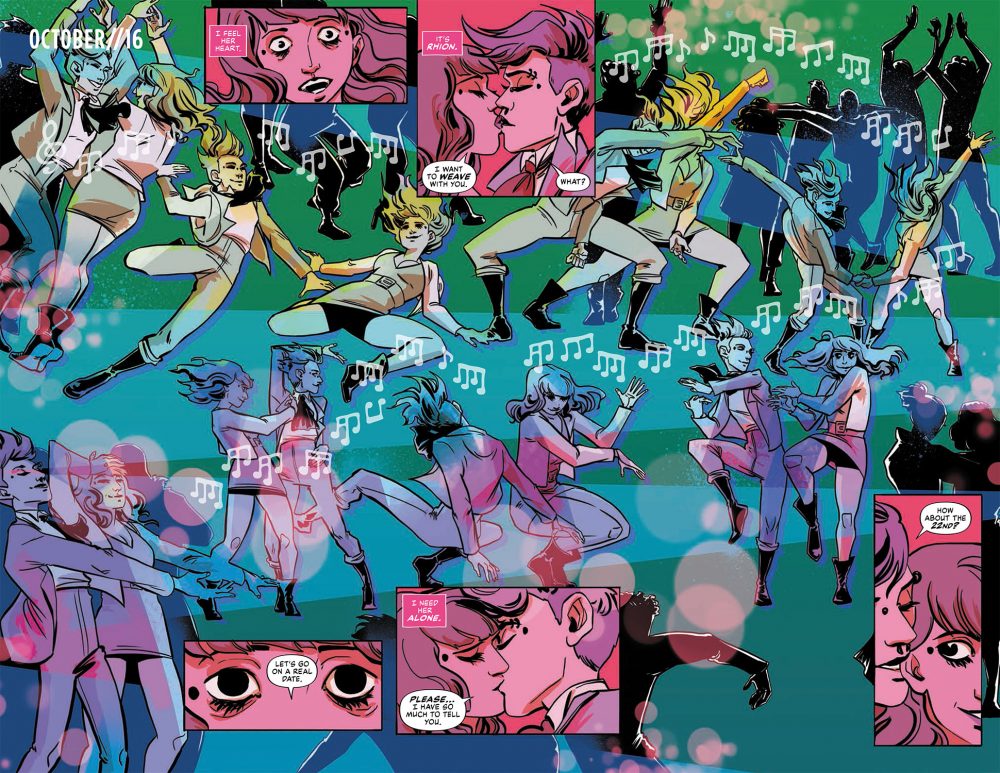
I’ve also been truly astounded that no one wants a PHYLO phone! I thought we were going to be trendsetters, and everyone would want a phone with skin and hair and a holographic screen! So weird.


